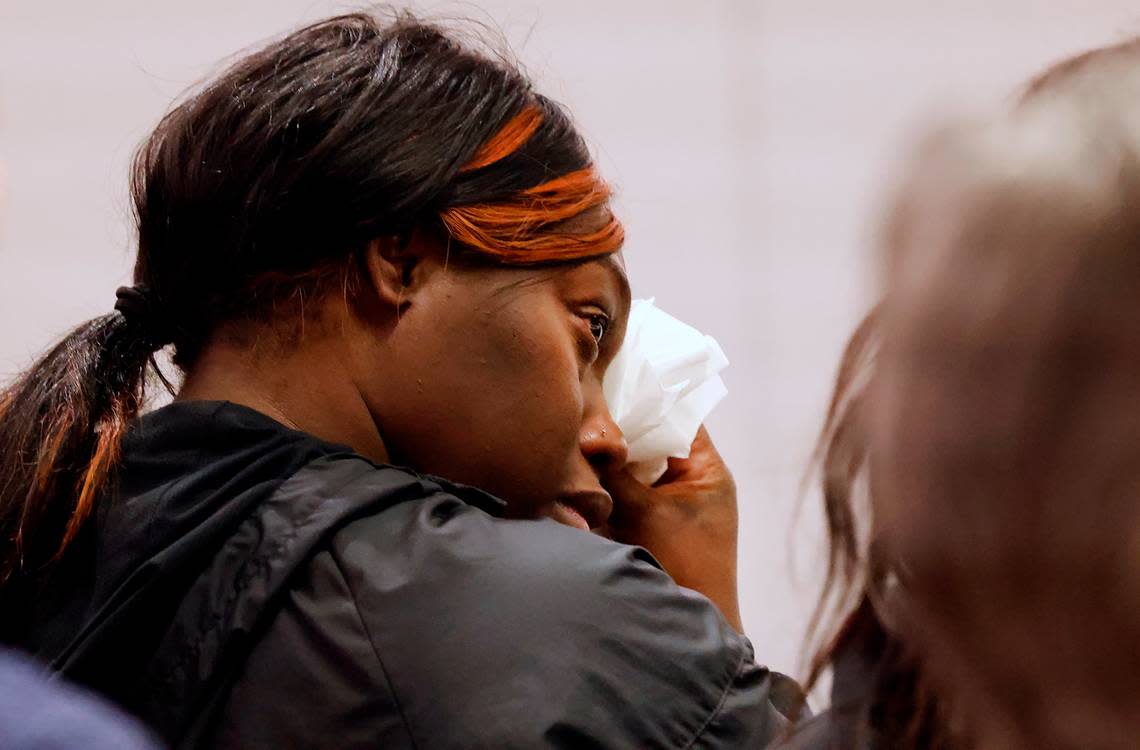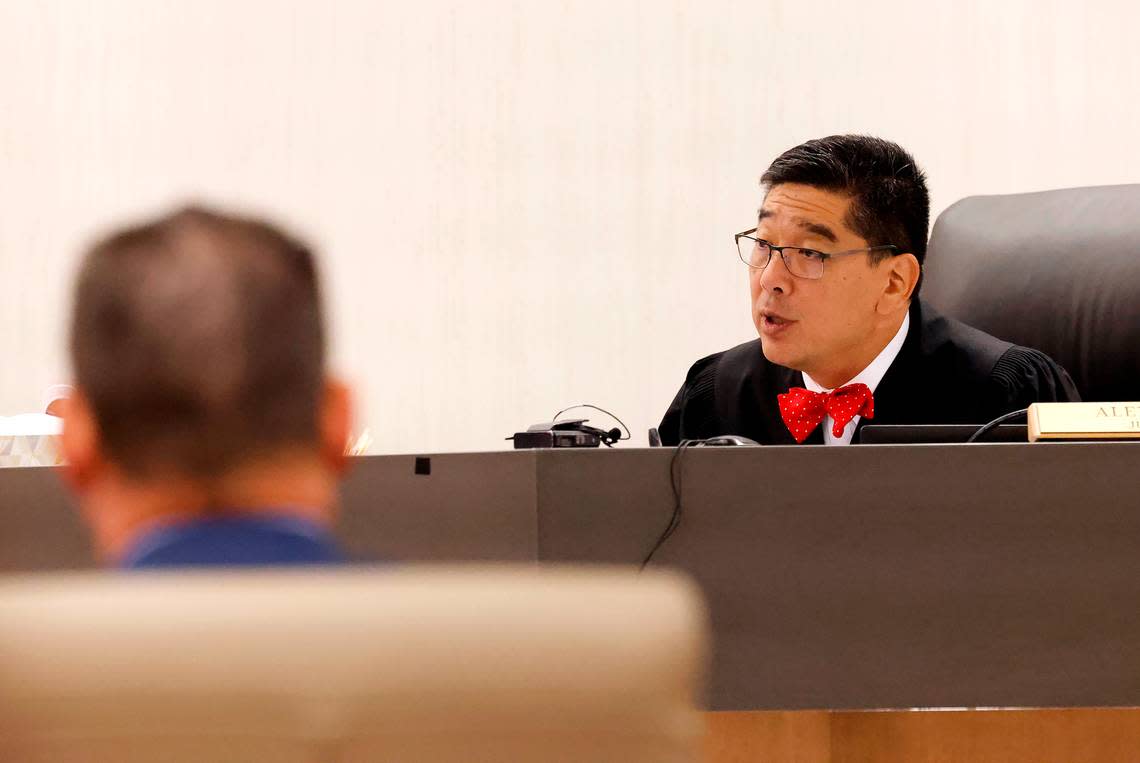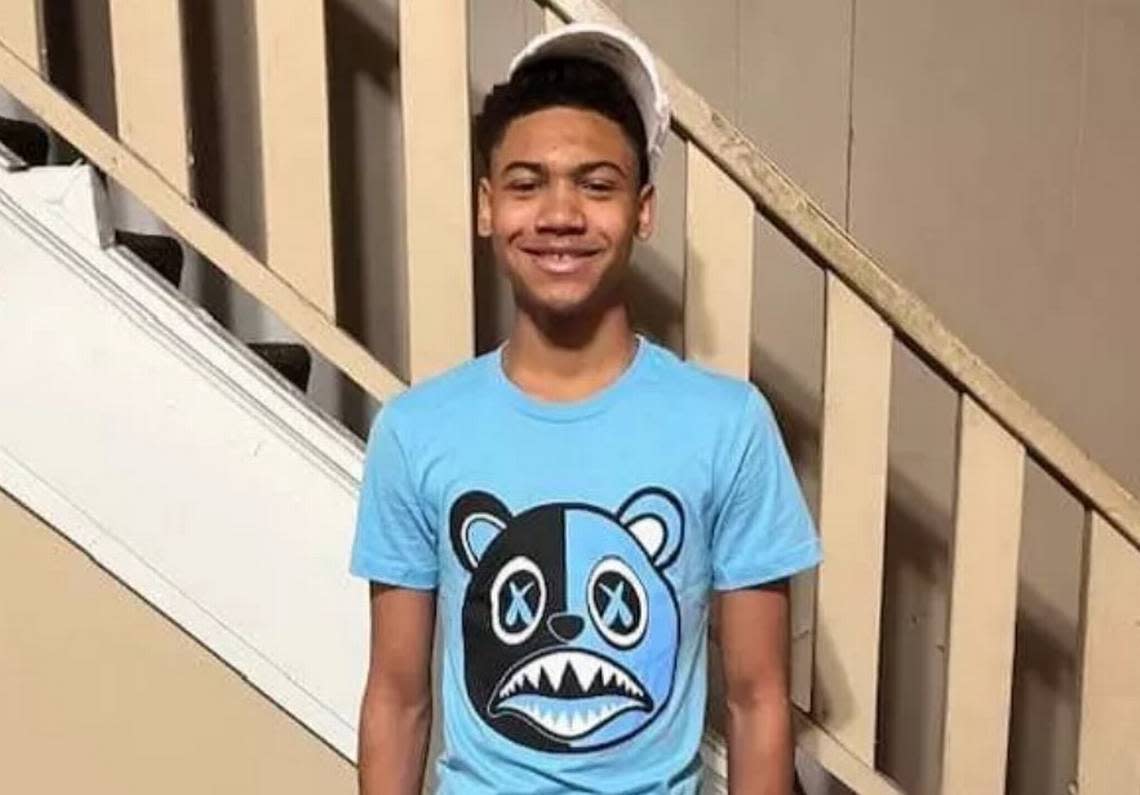Teen sentenced to 40 years for fatal shooting at Arlington’s Lamar High School in March
A Tarrant County jury has handed down a maximum sentence to the 16-year-old who opened fire at a group of students outside Arlington’s Lamar High School in March, killing one classmate and wounding another.
The jurors in Juvenile Court deliberated for about an hour before reaching the verdict Thursday afternoon, which will send the teenage defendant to prison for 40 years. He’ll begin serving his sentence at a juvenile facility and could later be transferred to an adult prison.
The teen who survived the shooting, who testified using the pseudonym Unique, said after the sentencing that she feels content with the verdict.
“It feels like he does deserve it even though he is a child himself,” Unique said. “It is a consequence of his actions.”
She was hit in the face by shrapnel and 16-year-old Ja’Shawn Poirier was killed. She said that being on the witness stand so close to the teen who shot her was a nerve-wracking experience. She was fidgeting more than usual, but isn’t sure that was because of nerves.
“I think it was just the underlying anger of what happened to me and what happened to Ja’Shawn,” Unique said.

Unique’s mother said that, as an educator with experience in mental health counseling, she really does believe in rehabilitation.
But the fact that before his 19th birthday, the teen will have the opportunity to go before Juvenile Court Judge Alex Kim for the possibility of parole is concerning, she said.
“That’s not enough time for rehabilitation,” the surviving victim’s mother said.
The judge could also to decide at that point to transfer the shooter from the juvenile facility to a Texas Department of Criminal Justice prison, where he would have to serve out the remainder of the first 10 years of his sentence before becoming eligible for parole again.
Unique’s mother said one of the most frustrating things as a parent is the people who ask her if her daughter was in the wrong place.
“She was in the right place at the right time, a place she should have been safe,” Unique’s mother said. “And a place Ja’Shawn should have been safe.”
She added that it is possible the shooter was sexually assaulted and is dealing with PTSD, but that it’s equally important to know that her daughter now also lives with PTSD from the shooting.
The teen had no visible reaction to his sentence.
“If you show me that you are causing problems at TJJD (Texas Juvenile Justice Department,) I will without hesitation send you to TDCJ,” Judge Kim told the teen after the sentence was announced.
“The juvenile court is not a punishment court; it is a rehabilitation court,” Kim said.
The judge shared a lesson from the Parable of the Talents from the Bible.
“Your situation going forward can get much worse, so do your best to make it better,” Kim told the teen.

Some of jurors were crying as they returned the verdict and one man carried a box of tissues. Jurors were recessed back to the jury room and the judge said he would meet with them before dismissing them.
“I can’t imagine this was an easy decision for them and honestly their tears told us that they took their decision seriously,” defense attorney Lisa Herrick said.
The Star-Telegram has not named the shooter because he was convicted as a juvenile. He pleaded guilty to capital murder and attempted capital murder. His sentence is 40 years for each count but all of the sentences will run concurrently.

Herrick said after the verdict that the teen’s statements in court about his desire to take accountability for his actions weren’t just words for the jury. He also knows what this sentence means, she said.
“He knows how seriously he needs to take his sentence,” Herrick said. “He knows how seriously he needs to focus on his rehabilitation.”
Herrick said she doesn’t know yet if he will want to appeal his sentence.
The teen, who was described as being soft spoken and on the shy side, didn’t react much in court. But during closing arguments, he was visibly distraught.
“He was crying and very upset when he was called a psychopath,” Herrick said of the closing argument made by the prosecution.
She also noted that he still hasn’t seen his mother since before his arrest, aside from when she was on the witness stand. Immediately after providing testimony, Herrick said, the teen’s mother left the courthouse and made her way back to Louisiana. She didn’t try to visit or contact her son, Herrick said.
One of the prosecutors, Assistant Criminal District Attorney Lloyd Whelchel, said after the verdict that he believes the shooting happening at a school played a role in the jury’s decision to give the teen the maximum 40 years.
He said that the teen’s behavior showed he was cold and calculated, and that his reaction to the prosecution’s closing statement shows, if anything, that the weight of his actions may have caught up with him. He said the fact that the teen put a shotgun in his backpack, walked to the school and then opened fire speaks to his character.
“Every step of the way, he had the chance to make the conscious decision to change his actions,” Whelchel said. “Maybe he finally realized what he did.”
Closing arguments
In closing arguments Thursday morning, Whelchel told the jurors that if they didn’t sentence the teen to 40 years, if he got out of prison and kills somebody else, it would be their fault. He told the jury that the teenager is evil and there is no amount of rehabilitation that will change that.
“That is his character,” Whelchel said. “You want to see what a young psychopath looks like? He’s sitting right there. He may not be old enough to get the diagnosis, but it’s there.”
Herrick asked for the jury to consider a sentence of 10 to 15 years. She pointed out that the adult brain is usually fully developed by 25, which would be the teen’s age if he were released after a 10-year sentence, and that he would be 30 if sentenced to 15 years.
Herrick countered the state’s claims that the teenager was an intelligent manipulator, reiterating that he scored very far below average on his IQ test with a 74. The defense pointed out that his behavior changed after the date in October on which he told police he was sexually assaulted. The teen told investigators about the rape allegations after his arrest in the shooting and the prosecution contends he fabricated the story.
It was after that alleged assault that he got into a fight at school and started missing classes, the defense said.
Herrick reminded the jury that a psychologist told the court the teen had signs of PTSD consistent with being a sexual assault survivor and that his story about the assault stayed consistent. She pointed out that even the detective, who eventually testified she didn’t believe the report about the sexual assault, said that he consistently provided all the details she expects to hear from a juvenile survivor.
The arguments in the closing statements highlighted the discussions about sexual assault, PTSD, intelligence and mental health as the primary focuses of the case for both sides. The defense, in a bid for leniency, counted on the jury’s sympathy and desire to see a teenager rehabilitated, while the prosecution did its best to paint him as a budding psychopath who had already committed his first act of deadly violence.
Expert testimony in the trial didn’t make it clear if that was true. While none of the psychologists called to the witness stand could count out the possibility that the teenager showed early signs of psychopathy, they also said those things could be attributed to mental, intellectual, emotional and social disabilities or stunted development that could be addressed with the proper treatment.
The last defense witness, Christopher Bellah, a psychologist who testified Thursday morning, told the jury that he did a psychological evaluation of the teen in which he found his IQ score was 74. Bellah said that is “very, very low” for his age and peer group.
Bellah also told the jury he preliminary diagnosed the teen with borderline intellectual functioning, PTSD, persistent depressive disorder with anxiety and an unspecified disruptive impulse control and conduct disorder.
Family member noticed changes in teen before shooting
Juror heard two days of testimony on Tuesday and Wednesday. The final witness on Wednesday, the shooter’s great-aunt, told the jury she still thinks he is a “good kid” when prosecutors asked her if her opinion of him changed because he fired a shotgun into a crowd of about 20 students.
She said she felt guilty for not looking in on her great-nephew more often. She said she noticed changes in him around October 2022, when he became more distant, depressed and would get anxious when someone tried to touch him or got too close to his personal space. She couldn’t figure out why.
When the teenager left Louisiana and moved in with his father in North Texas in 2018, his great-aunt would take him in every morning, make sure he had breakfast, take him to school and then drop him off at home after school. She told the court that his father was usually not home when she dropped him off and that she wasn’t sure if he knew how to cook for himself.
The defense told the jury in opening statements Tuesday that the teenager practically raised himself in many ways, including having to take care of his own dinner, do chores and manage himself after school.
The great-aunt said that she found Crown Royal bottles and bags at the teen’s father’s house, but wasn’t sure if the father had been drinking excessively in recent months as the teen suggested in a court-ordered psychological evaluation. She did say the father likely wouldn’t have been able to hold down a job for very long, as he did, if he were drinking excessively every night.
She said she was surprised when she found out in October that the teen got into a fight at school.
“It surprised me because [my great-nephew] isn’t a fighter,” she told the court.
Her testimony was emotional at times and she could be seen, during a brief pause in questioning, silently mouthing “I love you” to the teenager, who smiled and mouthed something back.
The most emotional part came when she talked about how she wished she had done more to be there for him.
“I feel guilty that I didn’t visit a little more,” she said in her testimony. “I feel guilty that he didn’t feel secure enough to talk to me about whatever was going on in his life.”
Since the end of 2021-22 school year, the great-aunt told the court, she only saw her great-nephew about once a month.
She told the jury she tried to become more involved with his life again, after he stopped visiting her every morning before school and she stopped picking him up, but wasn’t given the opportunity.
The prosecution countered by asking her if she and the teen had each other’s numbers and could have called or texted each other at any time, to which she said they did and they could.
The defense brought up her record of visiting him regularly while in the juvenile detention center, accepting his calls from the detention center and being present at almost every one of the detention hearings that happened every two weeks to determine whether he should remain in the juvenile detention center or be released to a family member.
The great-aunt said she thought the teen’s father tried “to the best of his ability” to be a good parent but also noted that he wasn’t home very much. She thought they had a close relationship, but that the father’s work kept him away from home most of the time.
After the shooting, the teen’s father was sentenced to more than six years in federal prison for possession of the shotgun as a convicted felon.
This is a developing story. For the latest updates, sign up for breaking news alerts.
